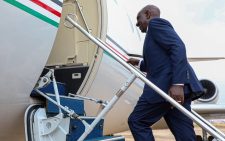When officials use power to achieve political ends

One of the key peculiarities of African democracies is the political elites’ appropriation of State apparatus and power, ethnicity, wealth and increasingly religion to outwit one another and maintain privileged positions.
It was, therefore, refreshing to hear Interior Cabinet Secretary Kithure Kindiki talk about his predecessor and how he should be treated with decorum and respect.
The clincher for me was his assertion that he will also one day be a former CS. His statement, though profound, sound like a drop in the ocean in a regime whose other leaders bandy policy statements in a fashion that speaks of appropriation of State power for political expediency.
Already there are panic-driven efforts to address the issues raised in the People’s Barazas and that tells you how the forums are putting the establishment on its toes.
Kenya National Trading Corporation (KNTC) is said to have mapped out 500,000 shops that will selling cheap maize flour and other basic food Kenyans.
The trade CS has also spoken for his Energy counterpart saying that they are working on the energy value chain to address the punishing depreciation of the shilling.
These are certainly good responses. However, how sustainable such measures are is another conundrum.
An economy anchored on different pricing of goods might work to allay the immediate problems but may not necessarily have a positive impact on the performance of the economy. In fact, money is being borrowed at imaginable rates to subsidise consumption. Sadly, it is the producers in these countries we are importing maize, rice and other cereals from that are reaping.
The cocktail of brewing issues affecting the common man from traders to salaried employees is cheapened by the appropriation of any voice that would be dissenting.
In fact, the many pockets of people centric protest are anchored on the deplorable and difficult situations they find themselves in with little sight of workable solutions.
Doctors are teaming up with Operation Linda Ugatuzi because all the avenues to address their issues seem to have gone mute. Traders who looked up to the bottom-up economic model are disillusioned and someone even duped them to vent and direct their anger to a noble business enterprise that should serve as a model rather than a target of hate. In fact, there is a lot this government can do for the Nyamakima, Gikomba and other traders beyond the PR visits to the Deputy President’s office.
Any trade tiff between China and Kenya does not in any way favour Kenyan traders and credit to China for responding in a very diplomatic fashion while underscoring their commitment to mutual benefit to citizens of both countries.
I’ve been to China on a study mission of how the Communist Party of China has managed to get its citizens out of poverty and I must admit that rather than engage in petty protectionist, poorly thought out politically driven policies; for a country that is thin on manufacturing, we need a nuanced strategy. A strategy that can leverage on Kenya’s solid geo-strategic and economic status to make Kenya a hub for trading Chinese goods in the region. The government can work with China at a higher strategic level to help Kenyans import from China on business-friendly terms that benefit Kenyan in the value chain as an anchor distributor in the region. Such agreements can be anchored on knowledge transfer arrangements that would call on Chinese manufacturers to both set up manufacturing bases here and also build capacity of locals through knowledge transfer.
In a nutshell the traders are on their own and the government, in protecting traders at the expense of consumers whose main goal is to have access to affordable quality goods, will only succeed in building another strand of protests.
It is possible to appropriate a few traders and the members of the diplomatic corp in their efforts to incorporate twerking content creators and influencers to push narratives on food security. But unless there are sustainable ways of addressing the runaway cost of basic commodities and issues affecting Kenyans in different sectors of the economy the ride will be bumpy.
—The writer is a PhD candidate in political communication












